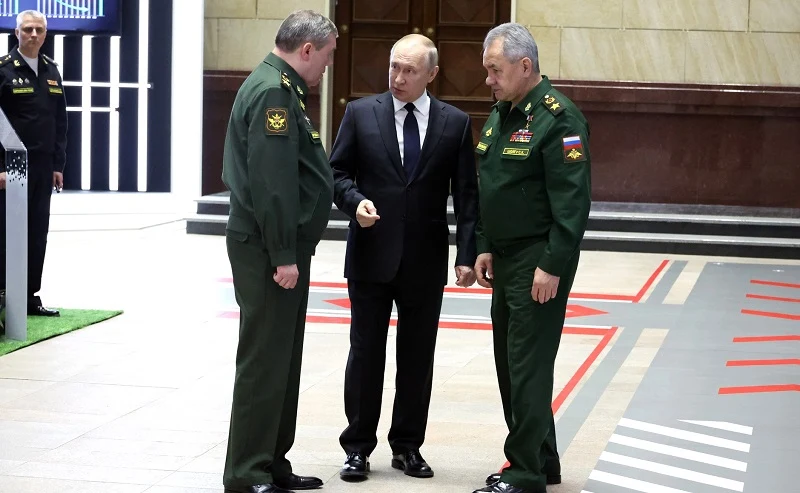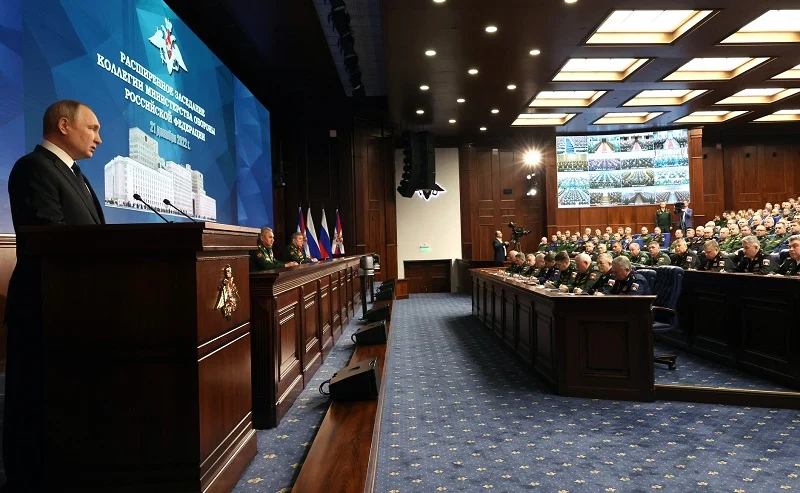

Russian President Vladimir Putin with his Defence Minister Sergei Shoigu (right) and Chief of the General Staff of the Armed Forces Valery Gerasimov before the annual Defence Ministry meeting in Moscow on Wednesday (Image courtesy: Kremlin.ru)
After having seen the significant role that weaponised drones are playing in its ongoing conflict with Ukraine, Russian President Vladimir Putin on Wednesday listed the improvement of Unmanned Aerial Vehicles (UAVs) as an “urgent task” for the country’s defence industry going into 2023.
Chairing the annual meeting of the Board of the Defence Ministry in Moscow, Putin, who is also the Supreme Commander-in-Chief of the Russian Armed Forces, stated that though Moscow has “good experience” in developing unique underwater UAVs, there is every opportunity to create a wide range of air and ground unmanned vehicles with the best, highest performance characteristics, including elements of artificial intelligence.
“An urgent task is to improve unmanned aerial vehicles, including strategic and reconnaissance-strike, as well as ways to use them. The experience of a special military operation has shown that the use of drones has become almost universal, and such an arsenal of means should be in combat squads, platoons, companies, battalions,” Putin told the gathering of top Russian Generals, including Defence Minister Sergei Shoigu.


The Russian President emphasised linking UAVs to each other, integrating them into a single reconnaissance network, and having secure communication channels with the headquarters and commanders. The target, he insisted, should be detected as quickly as possible and information transmitted to strike in real-time.
“Already in the near future, every fighter should have the opportunity to receive information transmitted from drones. This is what we need to go for, this is what we need to strive for. Technically, this can be implemented in the very near future, practically already now. I ask you to pay special attention to this when finalizing the entire complex of equipment and tactical equipment of personnel,” said Putin.
Russia has been accused by Ukraine of using Iranian-made Kamikaze Shahed-136 drones – also known as Geranium-2 – which is quite hard to detect even on military radars.
The meeting, which Putin pointed out was taking place at “a very important period” for Russia, summed up the results of the activities of the country’s armed forces in 2022 and deliberated on tasks for the next year.
Revealing that the level of modern weapons in the Russian strategic nuclear forces has already exceeded 91 percent this year, Putin also stressed on improving the combat readiness of the nuclear triad.
“This is the main guarantee of preserving our sovereignty and territorial integrity, strategic parity, and the overall balance of power in the world,” he insisted and added that work continues on the development of hypersonic missile systems “that are unique in their characteristics and have no analogues in the world”.
As he spoke on expanding the arsenals of modern strike weapons, Putin also listed the importance of increasing the combat capabilities of Russian aerospace forces, including the number of fighters and bombers when they operate in the coverage area of modern air defence systems.
Another point that the Russian President made during the meeting was the necessity to improve the communication system in order to ensure the stability and efficiency of troop command and control in any conditions.
“To do this, more actively use artificial intelligence technologies at all levels of decision-making. As experience shows, including recent months, the most effective weapons systems are those that operate quickly and almost automatically,” he remarked.
Shoigu, during his presentation, said that attempts to isolate Russia have failed as Moscow continues to expand the geography of international military and military-technical cooperation.
The Russian Ministry of Defence, he told Putin, is developing relations with the armed forces of 109 states in Asia, Africa, the Middle East and Latin America.
Also Read: India and Israel build partnership on drones and futuristic defence technologies
Minister for Electronics and Information Technology Ashwini Vaishnaw said on Friday that the government is…
Renowned human rights activist and political analyst Amjad Ayub Mirza has expressed a strong denunciation…
As was widely expected, the Indian economy grew by 6.5 per cent in real terms…
World No Tobacco Day, marked annually on 31 May, addresses a major public health challenge--the…
Defence Minister Rajnath Singh, addressing officers and sailors onboard India's first indigenous aircraft carrier INS…
The leadership team from the Central Tibetan Administration (CTA) arrived in Tokyo to participate in…